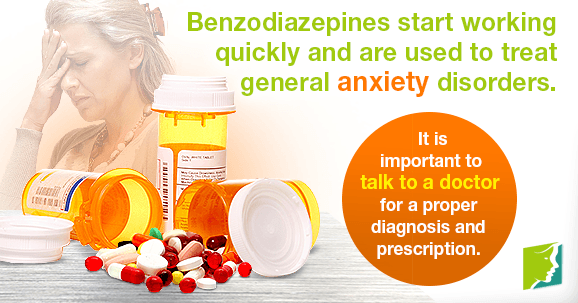Anxiety disorders last at least six months and are described as overwhelming and persistent feelings of worry, often when there is no real threat provoking these feelings. There are several types of anxiety disorders, which include generalized anxiety disorder, panic disorder, social phobia, specific phobias, post-traumatic stress disorder, and obsessive compulsive disorder. There are several treatment options when dealing with anxiety, but seeking professional help is recommended before taking any medication.
Anxiety Causes
As previously mentioned, anxiety is characterized by overwhelming, constant feelings of tension, worry, and nervousness. Anxiety disorders develop over time and are usually not caused by any one thing, but rather a combination of triggers. These triggers include:
- Excessive stress (either at work or at home)
- Hormone fluctuations
- Certain medications
- Emotional trauma
- Inactive lifestyle
- Poor diet
- Genetics
Symptoms of Anxiety
Symptoms of anxiety can be divided into either physical or psychological. Physical symptoms can include:
- Increased heart rate
- Shortness of breath
- Muscle tension
- Sweating
- Dizziness
- Insomnia
- Headaches
Psychological symptoms can be anything from feelings of dread and intense fear, restlessness, and irritability to anticipating disaster.
Anti-Anxiety Medications
There are anti-anxiety medications that have been shown to be effective in treating anxiety disorders. It is important to talk to a doctor in order for them to properly diagnose you and prescribe the medication that is right for you and your condition.
Benzodiazepines
These anti-anxiety medications start working quickly and are used to treat general anxiety disorders, panic disorders, and social phobia. They have a sedative effect on the nervous system. Clonazepam, lorazepam, and alprazolam are generic benzodiazepines.
Beta-blockers
Beta-blockers work to control physical symptoms of anxiety, like trembling, shortness of breath, and sweating. Beta-blockers can also be prescribed for heart conditions, like high blood pressure. They are generally only used for a short period of time.
Antidepressants
Some antidepressants can also be used to treat anxiety. When treating anxiety disorders, antidepressants are usually started out with low doses and increase over time as the need calls. Fluoxetine, sertraline, escitalopram, paroxetine, and citalopram are commonly prescribed for panic disorder, obsessive compulsive disorder, post-traumatic stress disorder, and social phobia.
Alternative Treatments
Natural treatments - like herbal remedies, exercising, and maintaining a healthy diet - can also be beneficial in treating anxiety disorders.
Herbal supplements
Sedative herbs can help calm the nerves, and soothe restlessness, and diminish nervousness. A few of these useful herbs are kava, lavender, hops, valerian, lemon balm, and passion flower.
Exercise and diet
Exercising for around 30 minutes a day five times a week has been known to help reduce stress, improve mood, and increase energy. Eating healthy can also help reduce anxiety symptoms. Try to include plenty of protein, fiber, complex carbohydrates, and fruits and vegetables into your daily diet.
Anxiety disorders range from mild to severe and affect your ability to carry out everyday activities, like making a phone call or meeting new people. On average, anxiety affects 40 million American adults. There are many treatment options that have been shown to be beneficial in treating anxiety. Prescription medications, like beta-blockers and benzodiazepines, have been shown to be effective in treating anxiety disorders. Herbal remedies and exercising are also helpful ways to treat anxiety. It is important to try and find the treatment option that works best for you.
Sources
- National Institute of Mental Health. (n.d.). Anxiety Disorders. Retrieved September 26, 2014, from http://www.nimh.nih.gov/health/publications/anxiety-disorders/index.shtml
- National Institute of Mental Health. (n.d.). Introduction: Mental Health Medications. Retrieved September 26, 2014, from http://www.nimh.nih.gov/health/publications/mental-health-medications/index.shtml#pub7




